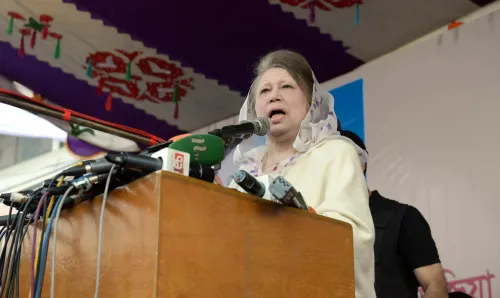IMF Evaluates Pakistan's Judicial and Regulatory Framework

Synopsis
Key Takeaways
- IMF reviews Pakistan's governance structures.
- Engagement with financial and electoral bodies.
- Report on corruption vulnerabilities due by July.
- Focus on structural reforms by 2025.
- Pakistan's long history of IMF loans.
Islamabad, Feb 10 (NationPress) The International Monetary Fund (IMF) is currently evaluating the judicial and regulatory framework of Pakistan as part of the ongoing $7 billion Extended Fund Facility (EFF) aimed at tackling issues related to governance and corruption vulnerabilities, as stated by the Ministry of Finance.
The Government of Pakistan has indicated that the IMF team is set to collaborate with various financial, revenue, and electoral institutions within the nation.
A comprehensive assessment is scheduled for publication in July, detailing strategies to combat corruption and governance weaknesses, according to Dwan, as reported by the Ministry of Finance.
In compliance with United Nations protocols, Pakistan is obligated to release the corruption report promptly following the review.
An IMF technical mission is currently in Pakistan for a week-long evaluation of six pivotal governance-related sectors and institutions, as per the ministry's statement.
In October, Pakistan pledged to the IMF to bolster institutional capacities to combat corruption, foster inclusive growth, and ensure a fair playing field for enterprises and investments.
This commitment has led to the establishment of a structural benchmark, which mandates the publication of a report on the Governance and Corruption Diagnostic Assessment (GCDA) by July 2025. This report will evaluate critical governance and corruption challenges and pinpoint essential structural reforms for the future, as noted by the ministry.
The media further reported that the mission is expected to interact with prominent members of the superior judiciary as well as leaders of the financial, revenue, and electoral institutions to assess their operational processes.
The mission will focus on six fundamental state functions, including fiscal governance, central bank operations, financial sector oversight, market regulation, the rule of law, and measures against money laundering and terrorism financing.
In 2024, IMF sanctioned $7 billion to Pakistan under a 37-month loan arrangement, with $1 billion designated for immediate release.
For decades, Pakistan has relied on IMF financing to fulfill its financial requirements and has faced challenges following years of fiscal mismanagement. It currently ranks as its fifth-largest debtor and has engaged in 24 loan agreements with the IMF since 1958.









